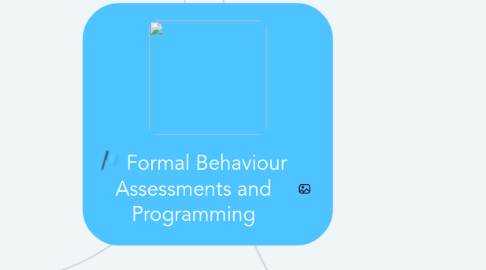
1. Clinical Diagnosis of Behaviour Disorders
1.1. Tourette Syndrome
1.1.1. For more information: https://www.ninds.nih.gov/Disorders/Patient-Caregiver-Education/Fact-Sheets/Tourette-Syndrome-Fact-Sheet
1.2. Anxiety
1.2.1. Click on the link for more information on specific Anxiety Disorders: https://www.verywell.com/what-are-anxiety-disorders-in-children-620508
1.2.2. Types
1.2.2.1. Generalized Anxiety Disorder
1.2.2.2. Separation Anxiety Disorder
1.2.2.3. OCD - Obsessive Compulsive Disorder
1.2.2.4. PTSD - Post Traumatic Stress Disorder
1.2.2.5. Phobias
1.3. Oppositional Defiance Disorder
1.3.1. Criteria- 4 of the following in the last 6 months
1.3.2. Often Looses temper
1.3.2.1. 2 or more times a week
1.3.3. Often argues with adults
1.3.3.1. 2 or more times a week
1.3.4. often denies compliance with adult requests or rules
1.3.4.1. 2 or more times a week
1.3.5. often deliberately annoys people
1.3.5.1. 4 or more times a week
1.3.6. often blames others for his mistakes
1.3.6.1. 1 or more times
1.3.7. often very touch or easily annoyed by others
1.3.7.1. 2 or more times a week
1.3.8. often angry or resentful
1.3.8.1. 4 or more times a week
1.3.9. often spiteful and vendictive
1.3.9.1. 1 or more times
1.4. Depression
1.4.1. Signs in Young Children: https://www.verywell.com/warning-signs-of-depression-in-young-children-1066873
1.4.2. Dysthymic disorder https://www.verywell.com/what-is-dysthymia-dysthymic-disorder-1066954
1.5. Eating Disorders
2. More Information
2.1. click on the link for Psychological services provided by the Durham District School Board http://www.ddsb.ca/Programs/SpecialEducation/Services/Pages/Psychological-Services.aspx
2.2. Label behaviour not children - Special Education Ontario https://specialeducationontario.wikispaces.com/Behaviour
2.3. Durham Childcare Behaviour Management Services http://www.durham.ca/departments/social/childcare/2010ChildcareReferralGuide.pdf
2.4. Caring and Safe Schools in Ontario K-12, 2010 - not sure if this resource is still applicable as it is a progressive discipline approach which is no longer at the forefront - restorative practices are but this document offers supports and strategies http://www.edu.gov.on.ca/eng/general/elemsec/speced/Caring_Safe_School.pdf
2.5. Ottawa Carleton School Board Assessments http://ocdsb.ca/programs/se/sep/Special%20Education%20Plan/Standard%206%20-%20EDUCATIONAL%20AND%20OTHER%20ASSESSMENTS.pdf
3. Common Educational Tests used as Assessments for Special Education (source https://dredf.org/special_education/Assesments_chart.pdf)
3.1. Social and Emotional Adjustment Tests
3.2. Apperception Tests (CAT, TAT, Roberts
3.3. Sentence Completion Tests
3.4. Rorschach
3.5. Piers-Harris Self Concept Scale
3.6. Projective Drawing Tests
3.7. Social Maturity and Appropriateness of Behaviour
3.8. Woodcock Johnson Scales of Independent Behaviour
3.9. Vineland Adaptive Behaviour Scale
3.10. Developmental Profile II
3.11. Child Behaviour Checklist
3.12. Conners Parent & Teacher Rating Scales
3.13. Behaviour Evaluation Scale 2
4. Formal Assessments many clinical or non teacher professional
4.1. Children's Depression Inventory
4.1.1. Assessment information http://images.pearsonclinical.com/images/assets/cdi2_image.png
4.1.2. Click on link for more information https://www.verywell.com/child-behavior-checklist-cbcl-1066570
4.2. Feelings, Attitudes and Behaviours Scale for Children
4.2.1. Assesses: https://www.mhs.com//MHS-Assessment?id=101:
4.2.2. Can be completed by students under 12
4.3. Conner's 3rd Edition
4.3.1. Assesses ODD, ADHD
4.3.2. For students age 6-18
4.4. Behaviour Assessment for Children
4.4.1. Evaluates Behaviour and Self-Perception in children 2 1/2 years to 18 in order to classify a variety of emotional and behavioural difficulties to aid in treatment plans
4.4.1.1. Includes scales for teachers, parents and self-reports for children 8-11
4.4.1.1.1. Assessment also includes
4.4.1.1.2. developmental history
4.4.1.1.3. adapative functioning scales eg. relations with parents, interpersonal relationships, self-esteem, self reliance
4.4.1.1.4. observation system
4.4.1.2. Self-reports do not pick up on youths at risk for emotional disorders or drug and alcohol use
4.4.1.3. identifies:
4.4.1.3.1. youths attitudes toward school and teachers
4.4.1.3.2. comparison of school maladjustment vs. clinical maladjustment
4.4.1.3.3. assessment of locus of control - which means the extent to which individuals believe they can control events affecting them
4.4.1.3.4. assesses students feeling of inadequacy
4.4.2. Mandated in Ontario as an Assessment for Eating Disorders
4.4.3. Usually implemented by clinical / school psychologists
4.5. Dutch Eating Behaviour Questionaire
4.5.1. Assessment measures:
4.5.1.1. Emotional eating
4.5.1.2. External eating
4.5.1.3. restrained eating
4.5.2. Eating styles that contribute to being or attenuate the development of overweight
4.6. Illness Behaviour Questionnaire
4.6.1. All information found on this was American there were no Canadian website affiliations with this test http://psychology.okstate.edu/faculty/jgrice/psyc5314/ibq.pdf
4.7. Functional Performance Record
4.7.1. could not find clear information on this
4.8. School Behaviours Rating Scale
4.8.1. Evaluates Primary Students Behaviour
4.8.1.1. Includes Rating Scales
4.9. Vineland Adaptive Behaviour Scale
4.9.1. Assesses adaptive behaviours including the ability to cope with environmental changes, learn new everyday skills, and demonstrate independence
4.10. Multidimensional Anxiety Scale
4.10.1. Uses Scales to categorize and assess major dimensions and symptoms of anxiety in children age 8-19 (US Research Based)
4.10.1.1. Scales for Major Dimensions:
4.10.1.2. Physical Symptoms
4.10.1.2.1. Somatic Symptoms (eg unexplained stomach aches) https://www.verywell.com/warning-signs-of-depression-in-young-children-1066873
4.10.1.2.2. Tense Symptoms
4.10.1.3. Harm Avoidance
4.10.1.3.1. Perfectionism
4.10.1.3.2. Anxious Coping
4.10.1.4. Social Anxiety
4.10.1.4.1. Humiliation Fears
4.10.1.4.2. Performance Fears
4.10.1.5. Separation/Panic
4.11. Brief Child and Family Phone Interview
4.11.1. Ontario Mandated - in Mental Health Service Facilities
4.12. Child and Adolescent Functional Assessment Scale
4.12.1. Ontario Mandated - in Mental health service facilities
5. Programming and Strategies
5.1. UDL
5.1.1. Co operative Learning
5.2. DI
5.3. Tiered Approach
5.3.1. Tier 1 Response to Intervention (RTI) For more information on the tiers click on the link http://www.specialeducationguide.com/pre-k-12/response-to-intervention/effective-rti-strategies-for-teachers/

